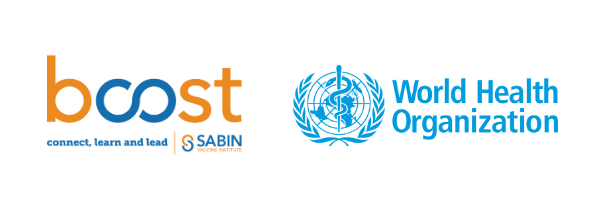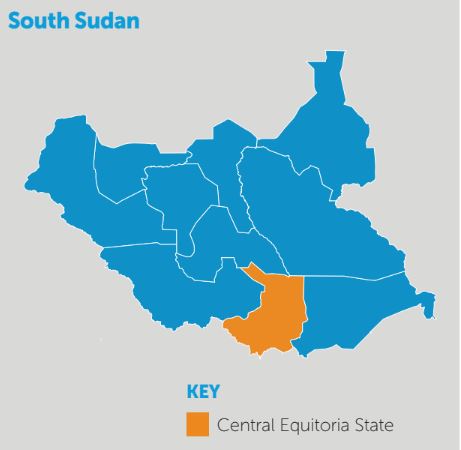Research – A Tool For Unlocking Assumptions Among Nomadic Populations In Juba, South Sudan
In May 2022, Sabin’s Boost Community and the World Health Organization (WHO) launched the first cohort of the "COVID-19 Recovery for Routine Immunization Programs Fellowship". The aim of this program was to strengthen the capacity of national and sub-national immunization professionals to plan and implement immunization programming during the COVID-19 recovery period, with the ultimate goal of reversing the declining rates of immunization coverage. After an intensive live engagement series, Fellows were tasked with drafting their own strategic proposal for implementation or case study for publication. This series of Bright Spots share Fellows' key learnings and takeaways from the program.
The phrase “pastoral nomadism” denotes the economic activity of people who move from place to place within an established territory to find suitable pastures for their domestic livestock. It also encompasses a cultural identity that is shaped by a region’s climatic and geographical factors. Such is the case for the pastoral nomads of South Sudan – the world’s youngest country. Their lifestyle, characterized by seasonal movement, is an adaptation to the rainfall patterns experienced in the country. The outskirts of Juba, South Sudan’s capital city located in the Central Equatoria State, are inhabited by a large population of pastoral nomads who precisely represent this identity. Unfortunately, because this way of life is often at odds with twenty-first century systems, it excludes or, at best, places nomadic communities on the fringe of receiving many public services including healthcare.
The health indicators of South Sudan are a glaring reflection of this exclusion. With one of the highest global infant mortality rates of 60 per 1,000 live births and under-5 mortality rate of 93 deaths per 1,000 live births, research shows that 75% of child deaths are attributed to preventable diseases. COVID-19 drove an even deeper wedge into the cracks of the health system as resources were diverted toward the pandemic, leading to a pause in immunization efforts. As large-scale vaccine stockouts became more frequent and health workers migrated to cater to populations impacted by the pandemic, vaccine preventable diseases and deaths surged. Already under-served communities became even harder to reach as pandemic-related fears kept them away from health centers.
Performance Indicators
Infant mortality rates of 60 per 1,000 live births
Under-5 mortality rate of 93 deaths per 1,000 live births
75% of child deaths are attributed to preventable diseases
As a focal point person for risk communication and community engagement in the Ministry of Health at state level, Stephen Kennedy Bojo bore witness to these challenges and was determined to conduct a study that addressed recovery efforts for immunization programs among nomadic communities living outside Juba. Financial and project management support were necessary for Stephen to achieve this goal, which is why he chose to bolster his skills by registering for the COVID-19 Recovery for Routine Immunization Programs Fellowship that kicked off in May 2022. The fellowship strengthened his skills and knowledge on how to bridge immunization gaps and implement recovery strategies.
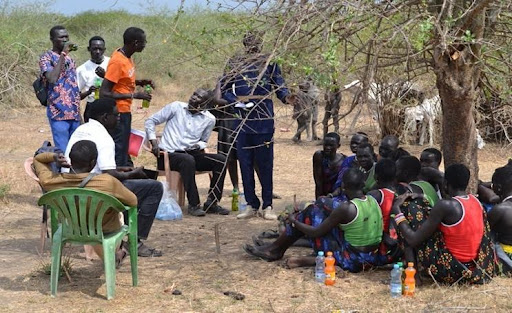
Academic research about access to healthcare for nomadic communities in South Sudan is very limited. Their mobile lifestyle makes it challenging for researchers to conduct extensive studies, not to mention the cultural barriers as well as limited research resources that also hinder the development of evidence based research. This made Stephen’s initiative vital to improving understanding about nomadic communities and resulted in a study about efforts to scale up immunization services for children under the age of one living outside Juba City.
Before embarking on his research in August 2022, Stephen needed to map out cattle kraals in the region. This approach was specifically tailored to nomadic communities since daily life is centered around the kraals and made it easier to reach community members. These initial efforts to collect data from the target population confirmed to Stephen the severity of the challenges facing nomadic communities. Most of the community members reside in regions that are over an hour’s trek from the nearest health center. At the time of his study, Stephen was the first health worker to reach out to these communities in close to two years.
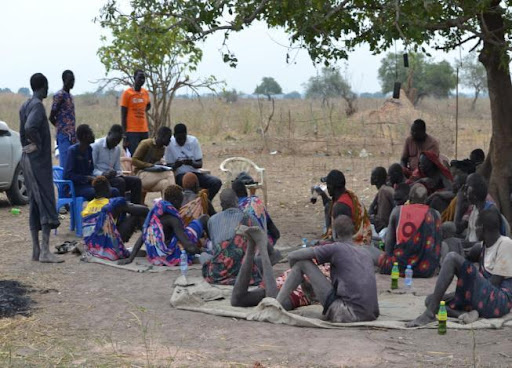
To successfully carry out his study, Stephen needed the involvement of other stakeholders including focal health personnel working at the payam level – the lowest tier of health service delivery, leaders of cattle kraals who could mobilize community members, and skilled technicians including data collectors and translators. Two kraals located outside Juba were selected for the study, Ballanyir cattle camp and Nush cattle camp inhabited by the Mundari community. One of the approaches deemed most suitable for the study was conducting focused group discussions that would yield insights about the accessibility of health services as well as the existing disparities that drove low demand for immunization by the nomadic community.
What Stephen learned during this study was that vaccine knowledge in the community was sufficient and often extensive, as participants of the study could clearly articulate the importance of vaccination and wanted their children vaccinated. The challenge, therefore, lies in having a healthcare system not properly adapted to the community it is mandated to serve.
A viable conclusion of this study was that there is a need for more outreach services in Juba. Building resilience and strengthening routine immunization requires nomadic communities to be involved in micro-planning efforts. Knowledge is indeed power, and with the knowledge gained from this study, Stephen intends to advocate for the health rights of Juba’s nomadic communities. Having established himself as the community’s focal person, he is well positioned to coordinate these micro-planning efforts that will bridge the cultural practices and health systems of Juba. It is Stephen’s hope that these tangible steps will result in adapting a system that better caters to the nomadic lifestyle, ensuring that fewer children slip through the cracks of the health system.
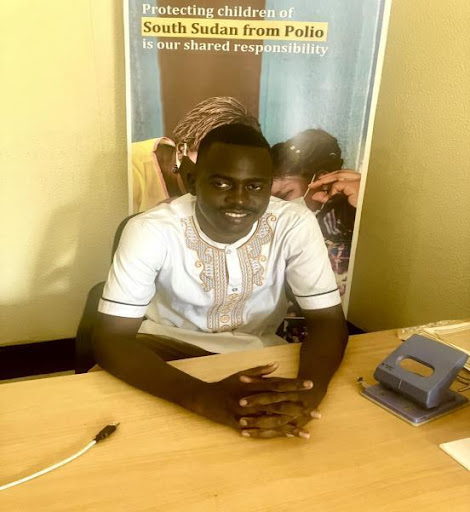
2022 Fellow & Contributor
This initiative was run by Stephen Kennedy Bojo, the Risk Communication and Community Engagement Officer for Central Equatoria State’s Ministry of Health. Stephen was inspired to participate in this fellowship because of his determination to help hard-to-reach populations such as nomads. In Central Equatoria State, nomadic communities are forgotten due to their unforeseen movement in search of pasture which often prevents them from accessing immunization services. Through the Fellowship and subsequent project he was able to shed light on the plight of nomadic communities with their high mortality and morbidity rates due to vaccine preventable diseases, and help to conduct awareness about importance' of routine immunization.
